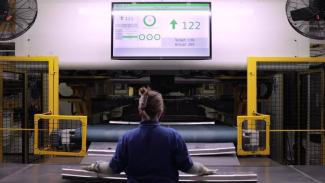What Is Connected Manufacturing and Why Should You Care About It?
Learn how a connected plant floor can streamline your manufacturing process and improve business outcomes.
Watch a Demo
Manufacturing is evolving; shop floor automation, additive manufacturing, cloud computing, and the Industrial Internet of Things (IIoT) are all contributing to a more efficient, connected plant floor. Businesses who fail to maintain pace will lose their competitive edge. These fast-paced shifts in the industry will require manufacturers to adopt these technologies while maintaining quality and personalization. In this article, we’ll discuss the nuances of connected manufacturing and how it can help manufacturing leaders respond to the changes currently taking place in their industries.
What is meant by connected manufacturing?
Connected manufacturing is a business strategy that uses cloud computing to harness operational and business data in order to help manufacturers improve their processes. Using cloud computing better connects businesses to their people, machinery, and supply chains, providing end-to-end visibility over processes. This comprehensive overview can then be used to provide greater efficiency, control, and customer satisfaction. Detailed information is captured in real time and instantly reported to the facility, department, or individual team member. This helps management and staff understand exactly how their role impacts the business and how they can work together to improve the efficiency of certain processes. Using connected manufacturing, businesses can increase uptimes, reduce operational costs, and improve the quality of service.
Connected manufacturing is much more than just improving production lines. Many companies are rethinking their business models and hinging them on the benefits of adopting of Industry 4.0 concepts. They’re hoping to use the increased visibility they gain from this adoption to integrate the information and knowledge side of the business with the operations group. This collaboration often results in companies offering a full array of after-sales services throughout a product’s life cycle.
One concern often cited when discussing connected manufacturing is the risk of job loss. Effective leaders often understand that human workers are central to industry digitalization. In response, they make concerted efforts to train their employees on these new technologies. These advancements enhance the human workforce and contribute to positive outcomes. More and more businesses are investing in up-skilling their staff on how to improve and optimize work using new technologies. Automating and eliminating mundane tasks will allow human workers to focus on more important aspects of the business.
Why should businesses prioritize connected manufacturing?
Manufacturing leaders should prioritize the practice of connected manufacturing because it gives them a clearer picture into the inner workings of the business. The real-time data collected from the plant floor will give an overview of everything involved in operations, helping to identify inefficiencies and fix flaws in machinery. Historical data combined with visual and intelligent analytics will help businesses adapt more efficient processes and make better informed decisions, creating a supply and demand plan to share with sales, marketing, and operations.
Artificial intelligence in manufacturing promises to revolutionize maintenance schedules for manufacturers. AI and machine learning can efficiently calculate when parts will need to be replaced and can even automate ordering replacements and scheduling downtime. This frees up the human workforce to focus on other more technical requirements. It also helps to create an efficient plant floor that has a minimal impact from downtime.
Businesses who use connected manufacturing benefit from access to mobile and web applications that allow equipment inspections and report information to be automated. Real-time temperature readings and regular inspections eliminate human error and helps increase the efficiency of manufacturing processes.
On-demand production is another reason more industries are investing in connected manufacturing. Connected manufacturing uses devices with built-in cloud analytics to quickly adjust production based on real-time customer behavior. In the past, production teams have produced large batches of products to ensure they can meet the demands of customers, but during quieter months, inventory sat idly in warehouses. With industries pushing the need for a more connected plant floor and manufacturing automation, businesses are recognizing improved resource efficiency and cost savings.
Manufacturers should avoid putting off the prioritization of connected manufacturing or risk falling behind their competitors. Instead of becoming intimidated by the implementation of new technologies, leaders should look at the value a connected plant floor can bring in terms of efficiency, value, and revenue, and its impact on delivering on customer demand.
How does connected manufacturing work with the Industrial Internet of Things (IIoT)?
Industrial Internet of Things (IIoT) refers to all industrial devices used in manufacturing that are connected to wireless networks, gathering, and sharing data. IIoT technology paves the way for a connected plant floor, leveraging both wired and wireless connectivity to enable the flow of data manufacturers can use to improve their processes and provide the benefits discussed above. For businesses to achieve a connected plant floor, they must use the Industrial Internet of Things sensors and machines that communicate data to the cloud. These devices are deployed at the factory level and the insights provided by the cloud are used to make manufacturing processes more efficient, productive, and profitable.
Connected Manufacturing Solutions
This article helps manufacturing leaders understand the benefits of using connected manufacturing technologies, including AI and machine automation on the plant floor. By developing a deep understanding of connected manufacturing and concepts related to Industry 4.0 and IIoT, manufacturers can keep up with the vast changes currently taking place in their industries. For more information, see our comprehensive guide to connected manufacturing. This extensive resource will help you plan and execute plant floor digital transformation.
Learn More



